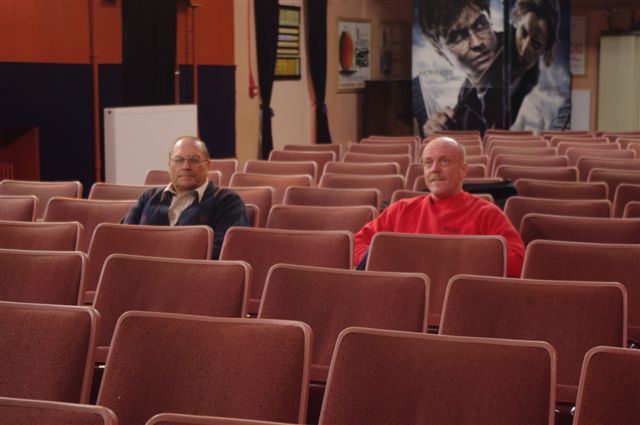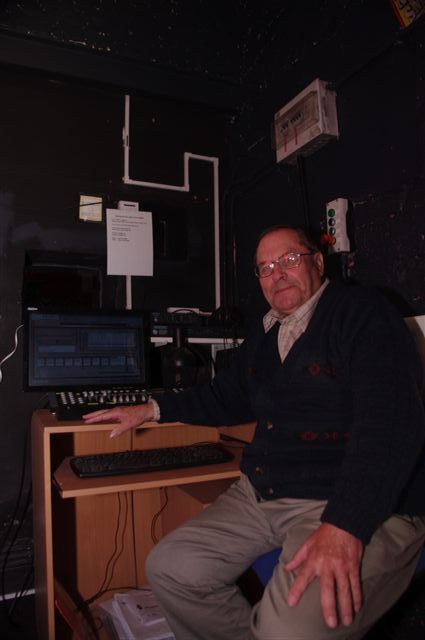The Ritz Cinema in Thirsk
I knew that the Ritz Cinema in Thirsk was a rare survivor of a cinema in a market town – but until I visited this year, I didn’t realise how long some people had been involved with it.
Peter Barr has spent a lifetime in cinema, becoming an apprentice projectionist in 1951. Even before this, he enjoyed film, and recalls, “When I was boy, the only cinema open on Sundays was the Lyric at Northallerton. So we when we lads were about 16 or 17, we used to jump on our bikes to go to Northallerton on Sundays.”
He is still involved in cinema today, as a volunteer at Thirk’s Ritz cinema, which celebrates its centenary this year.
Peter says, “I started as a rewind boy. We used to show twice nightly, six days a week, and the film changed every three days. In those days, film reels were only about 1000 ft long, so every eighteen minutes or so, you were changing from one projection machine to another. The audience wouldn’t notice, but there are little marks to tell you it’s changing, and once you’ve seen them, you spot them all the time – even on TV.”
The Ritz was opened in 1912 by Walter Powers, a musician who played the piano to accompany the silent movies. In 1927, the ‘talkies’ arrived, and during this period, two more cinemas opened in Thirsk. The Gaiety in Long Street suffered a fire in 1930. Marc says that this building is now a tyre depot. Another cinema, the Regent on Castlegate, opened in 1935.
Peter recalls, “The Regent had a glass canopy at the front, but it was constantly hit by wagons coming through on the Ripon road. In the end, they couldn’t insure it anymore, and it was demolished.” Later, the whole building was replaced by a modern block of flats with a bistro on the ground floor.
The Ritz too suffered at this time, but it was revived by local film enthusiast Ken Cartman. In 1983, Peter Barr took it over and, with his wife and brother-in-law, ran the cinema until 1993, when they sold the business. Peter says, “We worked seven days a week, and we all had day jobs as well. In hindsight, I don’t know how we did it.”
Since 1996, the cinema has been run by a team of volunteers. One of them, Marc Davies, claims: “It’s the longest surviving entirely volunteer-run cinema in the country.” He attributes the success to ‘dedicated workers, a good chairman, the right balance of people, everybody does their bit, and people feel an affinity – there’s some sort of magic about it. If the cinema closed tomorrow, the volunteers would be disappointed not to come in.”
For the centenary, Marc appealed through Dalesman Magazine for memories of the cinema. He received many letters, including one from Bill Bateman, who wrote that the town power supply – provided by a small power station on Station road – was subject to voltage fluctuations and breakdowns. This was no use for the cinema, so the proprietor invested in his own generator. It was a diesel engine, housed in a brick outhouse, and Bill describes the ‘thunka – thunka- thunka’ sound that indicated a film was showing.
Peter has many memories of the cinema, including shovelling coke for the old boiler. He says, “The coke came from the gas works on Long Street, but it was just tipped on the street – there were no bags. So we had to barrow it round to the boiler.”
In bad weather, they spread the clinkers from the boiler back onto the road, to help the lorries passing by on the road to Ripon.
Peter also recalls how long it took for newly released films to reach Thirsk. They were first shown in London, then the major provincial cities. He says, “When I started, we used to get films that were maybe four months old – you didn’t get a new film in three weeks like you do now.
To get into the projection booth, you have to go outside the building and enter through a different door. It’s because, says Peter, “It used to be nitrate film, which is flammable. The machines were all set up with fire extinguishers.”
Peter, however, was a successful projectionist, and never saw a fire.
Today, they’ve gone digital. Marc comments, “The digital equipment cost a lot of money, but the film makers set up an organisation to help small cinemas like us to get it, and we got some grants towards it. Even so, it’s still a lot of money for us. All our profits are reinvested into the business. We can’t pay anybody: without the love, it wouldn’t be here.”
The Ritz has seen many changes, but nevertheless, says Peter, “It has remained a cinema for 100 years.”
Local film maker Sarah Macmillan has made a film about the Ritz. It will be screened on Sunday 16 Sep 2012 at 7.30 pm in the Ritz. For further information go to Sarah’s webpage at http://www.northernlandscapes.org.uk/100yearsatritz.htm
Click here to go to The Ritz Cinema
Read the full article, in print only, in Dalesman Magazine




